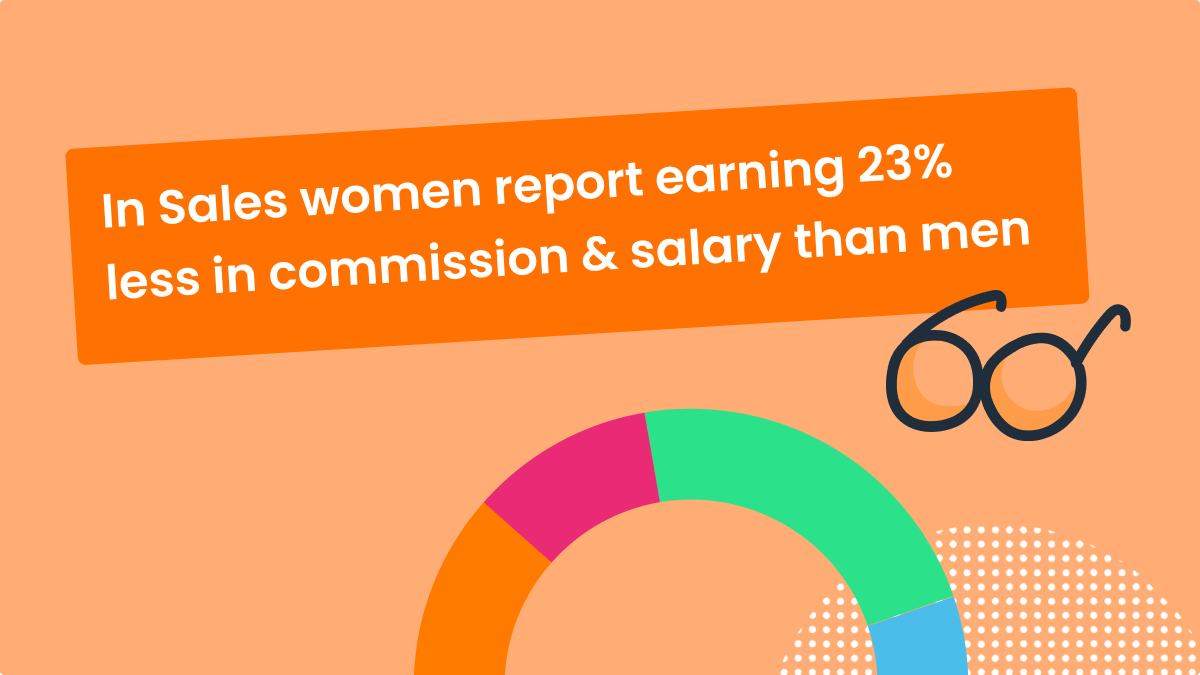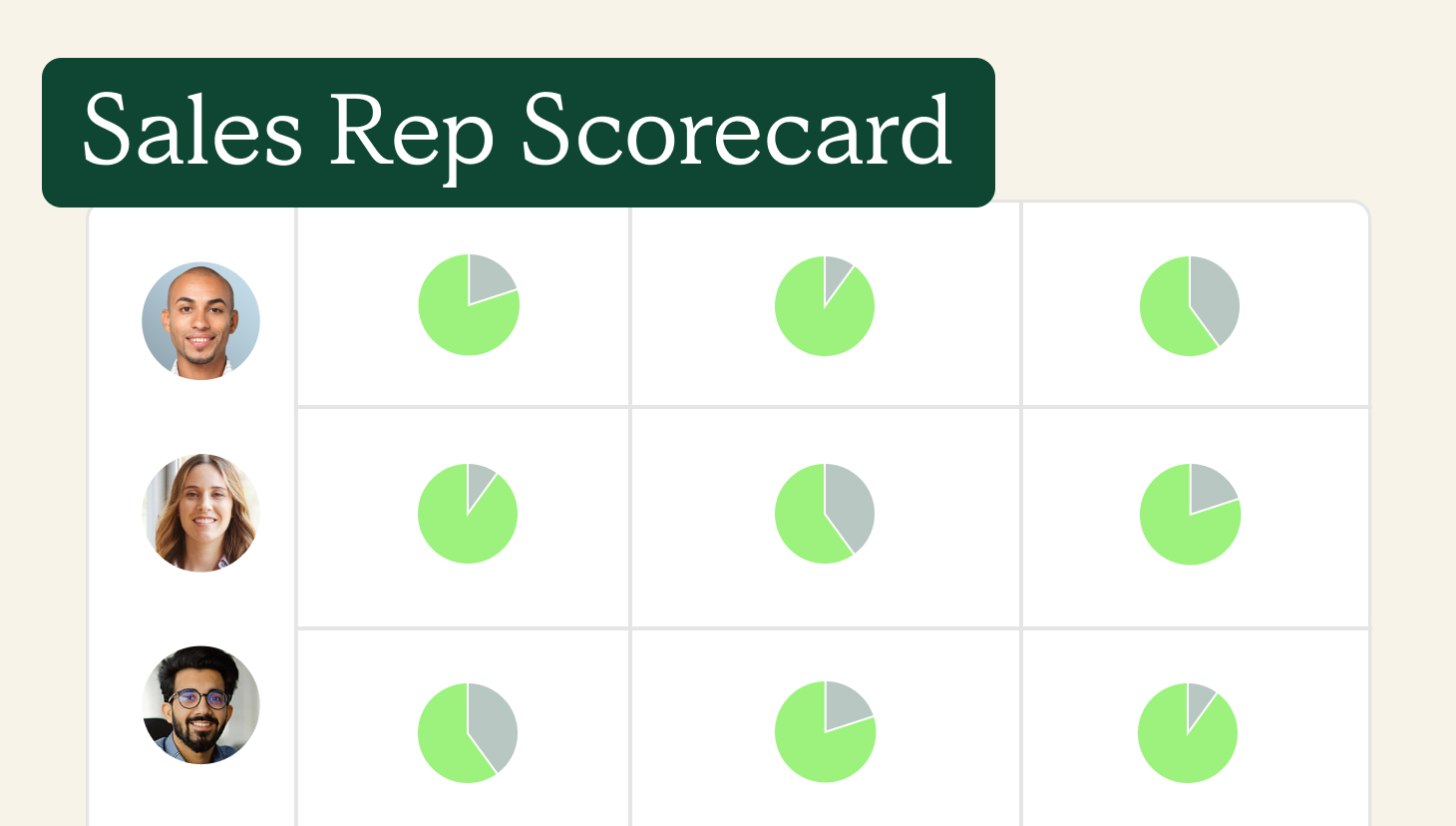This blog features executive compensation negotiation best practices from three women sales leaders from the professional sales community, Women in Sales, with which QuotaPath is a proud partner.
The gender pay gap remains steady, with women in full-time roles earning 83.7% of what men are paid — an inequity that increases even more for Black and Hispanic women.
While 83.7% spans industries and roles, in sales alone women reported earning 23% less in commission and salary than men. That’s according to a report published earlier this year. Analysts have suggested that part of this pay gap falls to the biases women experience in sales, such as leaders underestimating their knowledge or seeing women as “weak.”
Another factor, however, involves how men and women negotiate a job offer.
For a while, most reports and anecdotal evidence hinted that women were less likely to negotiate compensation. But the report showed that it wasn’t that women were holding back from negotiating.
“Despite a similar number of women and men negotiating their salaries and commission rates, men were more successful at getting what they wanted,” the report states.
Try QuotaPath for free
Try the most collaborative solution to manage, track and payout variable compensation. Calculate commissions and pay your team accurately, and on time.
Start TrialIs this for lack of negotiation skills or because business leaders have an easier time saying “no” to women in sales?
We can’t answer that. We also can’t control the latter. But what we can help with is elevating the voices of women who have seen success with executive compensation negotiation in their careers to help others.
Below, Ashlee Horn, CEO of Horn Sales Coaching, Heather Foidart, Business Owner and Sales Coach, and Rebecca Bormann, Founder and CEO of Rebecca Bormann Consulting, offered actionable advice you can immediately put into practice.
Learn what to keep in mind when negotiating, how to prioritize and communicate non-negotiables, how to ask for more, and steps to strengthen your skills.
Before reading our Q&A below, first meet our leaders:
- Ashlee Horn, CEO, Horn Sales Coaching, and former Global VP of Revenue at Toptal and Regional VP at Gartner.
- Heather Foidart, Business Owner and Sales Coach, and former Strategic Advisor at Coconut Software and VP of Sales at Shmoop.
- Rebecca Bormann, Founder and CEO of Rebecca Bormann Consulting, Advisory Board Member at Boss Babe Network, and former Managing Director of Sales and Services at Bell Techlogix, Inc.
Thank you all for taking the time to answer our questions and share your expertise.
Let’s start with how to counteroffer salary. What are some salary negotiation tips?
Ashlee: Early in my career, I was advised to keep a running list of my accomplishments always up to date. This allowed me to easily pull together a business case during the budgeting season to request a raise. It can be hard to remember all of the things you’ve done over the course of a year so waiting until the EoY review process will dilute the quality of your business case. Keeping a live list increases the volume and quality of data points you’ll have to draw on for a raise.
Heather: When you join an organization, you have the most leverage to negotiate your salary. Ensure you’re maximizing this opportunity and aligning with salary expectations at every interview process step. If a salary range was provided and you know your expectation is at the top end, be explicit about that early and often.
Rebecca: Be prepared with your past performance documents, competitive salary and compensation information, and the value you bring to the organization.
What are 3 things to keep in mind when negotiating Sales executive compensation packages?
Rebecca:
- The first offer is very seldom the best and final offer.
- Determine your minimum prior to engaging in compensation package negotiations.
- Consider benefits beyond financial like flexible work schedule, the ability to work remotely, stocks or stake in the company, non-compete requirements, outreach/marketing/training, and professional development budgets.
Heather:
1. Ask for the compensation range and on-target earnings upfront. The hiring company should provide the salary range and on-target earnings estimate first before you share your expectations.
2. Look beyond just monetary compensation and consider what’s most important to you. Perhaps it’s a flexible schedule, a 4-day work week, or remote or hybrid work. Other factors to consider are benefits like 401k matching and health insurance. Sometimes, you can negotiate to waive the waiting period before you’re eligible for insurance. Or negotiate a higher 401k match.
3. Equity. While it can be lucrative to have equity in early-stage companies, keep in mind that up to 90% of startups fail. I never recommend accepting less money in exchange for equity or working for commissions only.
Ashlee:
1. Scalability of the compensation package over the long term. Example: In Sales, it is common to receive a percentage of business unit growth commission or bonus. You should ensure that the plan is designed to scale.
2. Entry salary is key. Your future earning potential at the organization will be determined by your salary on Day 1. Most organizations have an upper limit on the percentage of annual raises each year, meaning you are unlikely to see much more than a 5% annual merit increase even with a stellar performance.
3. Incentive-based packages or recurring bonuses should be clearly and quantifiably defined. I’ve seen organizations that provide a bonus to increase the overall OTE and attract elite talent in the marketplace and then use qualitative, changing metrics making the attainment of an MBO or bonus nearly impossible.
Throughout your career, what have been some of your must-haves? How did you communicate these?
Heather: I value flexibility in the workplace and paid time off for my passion in life, traveling. I am always upfront with my employers about my PTO expectations. When environments say “unlimited PTO”, I recommend negotiating an explicit amount of time you would like to take annually. When I travel, I fully unplug and always ensure my leaders are on board and aligned with this non-negotiable.
Ashlee: Base salary — especially in sales organizations that tend to entice talent with a large OTE number.
When you are new to an organization, there are many unknowns: customer perception, product-market fit, number of open roles, etc. Many of these should be teased out as you assess an opportunity but you won’t be able to learn everything. While successful sales leaders tend to be incredibly confident in their abilities to succeed, they also need to protect themselves from circumstances outside of their control.
It takes time to hire great talent and drive change when you are new to a role. You could lose 30% of your OTE because it takes you two quarters to assess and upgrade the talent on your team, base salary negotiation gives you the opportunity to build for the long term while still improving short-term results which is what an organization should be looking for in a sales executive.
Rebecca: My non-negotiables include base salary, uncapped commissions, equity, and inclusive work environment and culture, the ability for a career path and professional development, generous PTO, and the ability to work remotely with a flexible schedule.
Transparency is key and my best practice is to share the must-haves upfront and also to ask and understand the organization’s must-haves as early in the interview process as possible.
What are some red flags candidates should be on alert for during the negotiation process?
Heather: An employer should always be able to share the breakdown of the variable compensation plan. Know the metrics: Average deal size, time to close, ramp time, win rates, % of the team hitting quota, etc. If a company has a “story” behind why they don’t have these metrics, it’s a red flag. Also, make a plan. If your quota is $1M, the average deal size is $50k, and the win rate is 25%, you would need to close 20 deals per year (with 80 opportunities in the pipeline).
Rebecca: If the organization is not willing to discuss compensation packages upfront. Other red flags include a lack of diversity in the organization, especially at leadership levels, and an unwillingness to allow you to talk to peers or teammates during the interview process.
Create Compensation Plans with confidence
RevOps, sales leaders, and finance teams use our free tool to ensure reps’ on-target earnings and quotas line up with industry standards. Customize plans with accelerators, bonuses, and more, by adjusting 9 variables.
Build a Comp PlanWhat steps can leaders take to strengthen their executive compensation negotiation skills?
Ashlee: Be intentional in your negotiation. I’ve seen many reps especially women, negotiate with me simply because they read that they should. They have not prepared a business case nor do they come to the table with a clear ask, they seek more. This is unproductive. Know your numbers, and your contribution to the business, and articulate the return expected if the organization were to continue to invest in you.
Ask ONCE for what you want. In one of the worse botched negotiations I’ve seen the candidate asked for two specific things. I fought hard as I believed in the candidate and I was able to get executive approval for those terms. Recruiting went back pleased to share good news and the candidate asked for more. I was unwilling to request more a second time, so I pulled the offer. It became apparent the candidate was going to continue to see what was possible, which reeked of low integrity. She lost credibility with me and I lost confidence in her value to the team.
Help your leader advocate for you. Write a clear business case outlining your role in high-impact projects, revenue contribution, and other accolades that lead you to believe you deserve further investment.
Be specific in your ask. Do your market research. Avoid comparing yourself to others internally, it is a poor look and leads to team disruption. It does not benefit you or anyone else. Have a % increase request or a specific dollar amount you’d like to see. Providing the other side with a few options makes it easier for them to find a creative solution that will leave you both happy.
Heather: Hire a coach! I help women gain confidence and navigate the hiring and compensation conversations. We role-play, discuss those red and green flags, and work on positioning tactics. Negotiations don’t have to feel anxiety-inducing.
If you approach negotiation calmly and feel prepared for the conversation, you can successfully negotiate more. The fun part is knowing what “more” is for you, money, flexibility, time off, etc.
Rebecca: I recommend attending workshops or professional development sessions around negotiation skills and best practices. I see masterminds and workshops popping up on this topic more and more in the last couple of years. Additionally, it’s a great topic to discuss and ask for advice from your mentors and sponsors.
***
Thank you again to Ashlee, Heather, and Rebecca for their thoughts on executive compensation negotiation. We connected with them through Women in Sales, a professional community focused on elevating, empowering, and promoting women within the sales profession, which we’re a proud partner of.
For additional support with sales compensation management, from design through tracking and payment, learn more about QuotaPath by scheduling time with our team.



